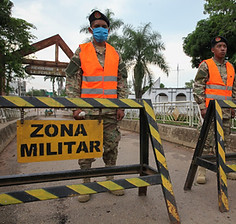

COVID-19 AND (IM)MOBILITY IN THE AMERICAS
This is an (un)finished project – therefore under construction– that collectively reflects on (in)mobility and control in the Americas during the pandemic. We sought to map three main themes: 1- state measures; 2- risk situations the migrant population currently face, particularly internally displaced persons, deportees, detainees, asylum seekers, refugees, irregularized migrants, whether they are adults or children or adolescents; and, 3- the social and collective responses in each of the national spaces. By invoking "mapping," we are not by any means intending to produce a fixed map of the continent, or geo-referenced information. In the context of this project, mapping has different meanings. On the one hand, our task has involved gathering press information, systematizing it, and creating a public digital archive about the tension between (in)mobility and control in the vast majority of countries on the continent during the initial moment of the pandemic. On the other hand, inspired by critical cartography, mapping has here implied “deconstructing the map” (Harley, 1989) of the Americas, in an effort “to read between the lines of the map –in the margins of the text – and through its trope to discover the silences and contradictions that challenge the apparent honesty of image” (1989:3). Mapping has signify brought to light the hidden spaces or conflicts that rests upon (in)mobility and control during the pandemic which deliberately remain outside of a traditional map and thus often outside of public discussion.
How to navigate the site?
1
By common situations in the Americas: the countries where these common situations are occurring will show on the map of the continent together with a brief explanation that can be further explored in the corresponding section. Virtual conversations will be held around each common situation or (im)mobility scenario. The dates for these events will be announced on the website.
2
By country: an entry will be displayed containing country-specific information on:
-
Poverty data
-
Data on migration patterns
-
Covid-19 infection data
-
State measures taken
-
Alert of critical situations of population in conditions of mobility
-
Social responses
At the end of each entry we have included the link to the digital file of our google drive that we built collectively and continue to update.

GENERAL
OVERVIEW

COMMON SITUATIONS

Countries where it occurs
National borders across the Americas have been closed in an effort to preserve public health measures and prevent the spread of Covid-19. Despite the existence of cross-border populations and zones of forced displacement, migratory controls have intensified and borders have been militarized. If free mobility was an ideal, today it seems to be a national menace.
Border Closure and Hyper-Surveillance

SOCIAL RESPONSES
Associated Networks


There are two initiatives located on the southern Mexican border linked to the Colegio de la Frontera Sur and the Cátedras CONACYT project, carried out by coordinators Sergio Prieto and Abbdel Camargo.
The Observatorio de Movilidades and Territorios-OMT propose the assessment, consideration, collection and/or systematization of data specifically linked to key aspects of the region, through permanent monitoring of the territory and its (im)mobilities.
The Laboratorio de Investigaciones Transfronterizas-LIT endeavors to overcome state-centric limitations of the traditional definition of “border” through complex and innovative approaches to border territories, pointing to comparative analysis with other global border regions.

